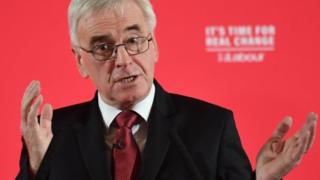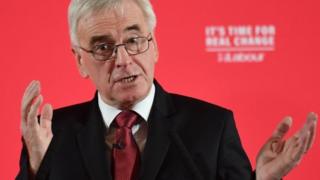General election 2019: Workers under Labour ‘will take back control’
John McDonnell also says there would be a cap on chief executives’ pay in the public sector. …

 Image copyright AFP/Getty Images
Image copyright AFP/Getty Images Shadow chancellor John McDonnell has said workers and consumers would “take back control” under a new business model if Labour wins the election.
In a speech in Westminster, he said company boards would include workers and elected members, giving them greater influence over pay structure.
And public sector chief executives would not be allowed to earn more than 20 times someone on the living wage.
That would mean a maximum salary of about £350,000.
The plans were part of an overall vision to create a business model that was not based on the “unfettered pursuit of profit maximisation”.
But, responding to Mr McDonnell’s speech, the British Chambers of Commerce said it would be “misguided to impose a rigid, one-size-fits-all approach”.
The shadow chancellor said the relentless pursuit of shareholder value and “corporate greed” had been to the detriment of the workers who create that wealth.
“Labour’s reforms to how our large businesses and public utilities are governed, owned and regulated and how both workers and consumers are represented will genuinely enable them to take back control,” he said.
Mr McDonnell also announced:
- Workers would become shareholders in their companies
- Large companies that don’t take adequate steps to tackle climate change would be delisted from the FTSE 100
- There would be no windfall tax on oil companies. This is essentially a one-off tax imposed on a company or industry by a government, usually imposed when an industry is perceived to have made excessive or undeserved profits
- Plans to introduce an Excessive Pay Levy on companies over disparities in pay between senior executives and other employees
- A requirement for companies to set out their policy for tackling the gender and ethnicity pay gap
- An overhaul of the UK’s system of regulation, including establishing its only regulatory bodies
Mr McDonnell said Labour would “rewrite the rules” of the business model and “treat people fairly and with respect”. In the past, he said, workers had “often been treated as virtual chattels”.
He also outlined plans to overhaul the business audit sector to make it more independent because, he said, it was too dominated by the “big four” audit companies.
“Under Labour, the big four will not be allowed to operate like a cartel,” he said.
“At the heart, we believe that every business should be a partnership – between employees, customers, managers and shareholders – for the long-term success of the enterprise.
“Many European countries have more robust systems to secure long-term decision-making than the UK.
He adds that, if Labour gains power, it will rewrite the Companies Act “so that directors have a duty to promote the long-term interests of employees, customers, the environment and the wider public”.
Student debt
Earlier, Mr McDonnell confirmed on BBC Radio 4’s Today programme that Labour was retaining its policy to scrap student tuition fees as a start to overhauling the system of financing tertiary education, including student loans.
The government “must realise that the system is falling apart”, he said, adding: “Large amounts of that debt is not being paid off and the government is having to write it off.”
He added that there “is an approach that has to be taken that looks at existing debt”.
When pressed on whether Labour will cancel student debt, Mr McDonnell added: “What I’m saying is, it has to be addressed in some form by whoever is in government, because the system – exactly as we predicted – is not working.”
Responding, Education Secretary Gavin Williamson said: “We can’t trust Jeremy Corbyn with our economy and his plan for two more referendums (on Brexit and Scottish independence) would cause havoc next year.
“Only the Conservatives will get Brexit done and keep our economy strong.”
The British Chambers of Commerce said in a statement: “It’s one thing to support employee ownership, stronger corporate governance and a transition to a greener economy, which have had positive impacts on many firms. But it would be misguided to impose a rigid, one-size-fits all approach.
“Getting our economy moving requires serious investment in skills, infrastructure and a reduction in business costs. But extensive government interference in ownership and governance could deter investors and damage confidence.”
It said the next government must work more closely with businesses, with success depending on “partnership, not diktat”.



